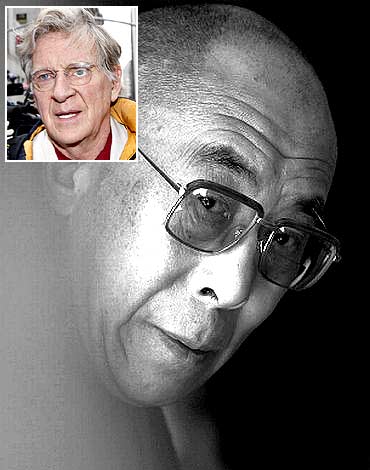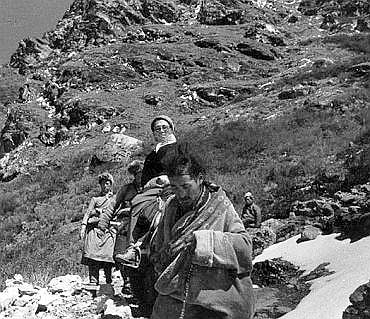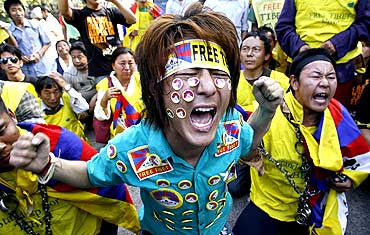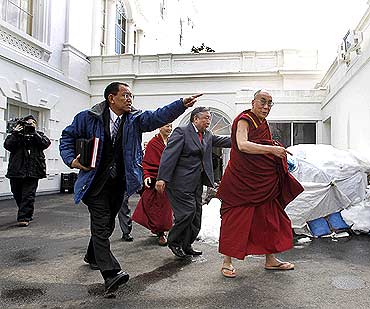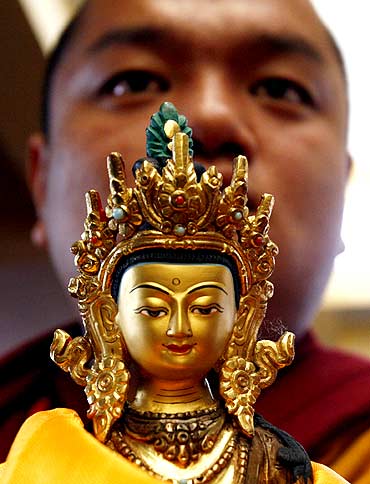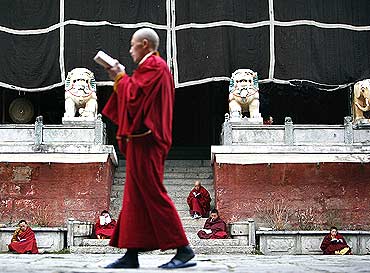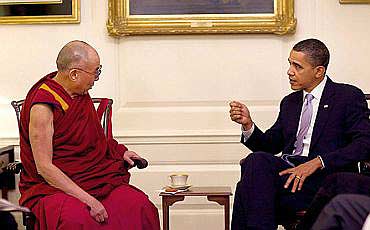 | « Back to article | Print this article |
Why the Dalai Lama Matters
He speaks to Claude Arpi about as diverse subjects as his years when he was a monk in north India in the 1960s, his relations with the Dalai Lama (Thurman's latest best-seller is entitled Why the Dalai Lama Matters), but also of 'capitalist' China, the Buddhist wave in the West, his idea of a Second Renaissance, his work for preserving Indian sastras at Columbia University, the Barack Obama-Dalai Lama encounter and his vision for the future of the planet.
Professor Thurman, I would first like to ask you about your involvement with India, Tibet and the Dalai Lama. How did it start?
I first came to India in 1962, when I was 21. I reached in November after staying in Turkey for eight months. I was looking for some spiritual teaching (from Sufi masters). Then, I thought yoga would be 'the thing'.
Here in Delhi, I met some swamis; I liked them, but when I later met Tibetans lamas, something woke up in me, it was like my spiritual vasana (present consciousness of past life perceptions). I had discovered the Buddha Dharma in its original form.
'I was the first foreigner to be ordained a monk'
But I met the lamas themselves. I was so excited. I got a job in the lama's school in Dalhousie (Himachal Pradesh). I started to study the Tibetan language and Buddhism, while teaching English to the young lamas.
It is there that I met an old Mongolian lama called Geshe Wangyal. He had lived in Tibet for 35 years and escaped early after the Chinese invaded Tibet in the 1950s (he eventually migrated to the US). It is with him that I started serious studies. I had karma with him.
You know how it then worked in Asia: You met someone, and this person gave you a message to carry for one of his friends somewhere else. It is how I met him. The minute I saw Wangyal, I could not move, I was stuck on the spot. It was karmic.
I learned the Tibetan language in 10 weeks with him. I studied with him for about a year-and-a- half.
Had you met the Dalai Lama by then?
I saw him from a distance in 1962, but in 1964, I was introduced by Wangyal. I wanted to become a monk but Wangyal kept refusing; I wanted to devote my life to (Buddhist) studies. Wangyal told me: "You are sincere, you are already living like a monk, but in the long term, it is not your karma, don't formally become (a monk)."
I was not ready to listen to him, I wanted to shave my head and go for it. Wangyal told the Dalai Lama: "This boy is a good boy, he is serious, but although he is serious, don't make him a monk. In the American life, he won't be able to keep his vows."
His Holiness made me wait about a year and I was eventually the first foreigner to be ordained a Tibetan Buddhist monk in 1965. It is so easy to be a monk, you have so much social support, it is like getting a life-long McCarthy fellowship; you are supported by the community; it is wonderful.
After the Dalai Lama had given in, I remained a monk for one-and-a-half year only. I had been sent back to the West (to Argentina with a lama as Spanish translator), but it was difficult, there was nobody to speak too, not even the Hare Krishna people at that time; everybody thought that I was mad.
There was no support for a monk. So after sometime, I re-entered the university, became a lay person, then I fell in love and married, and so on Geshe Wangyal was right. Now, I have to say that I am the first ex-monk.
'Tibetans won't turn violent during Dalai Lama's life-time'
The Dalai Lama matters on the world plane. I call him the world leader although he does not have a country today and has no (political) recognition. He is an ethical and spiritual leader, but also a social and political leader; because he brings ethics and spirituality into politics. It is where it should be.
Politics should be about truth and ethics. Politicians should serve people's ideals. The Dalai Lama brings this (into politics).
All leaders who have met him agree with this, except for the leaders of China who say that he is not a nice fellow; although, they perhaps know, but can't say it.
The Dalai Lama met the first two generations of Chinese political leaders (Mao Zedong, Deng Xiaping etc)?
But he has never met the current leadership. It is amazing that the leadership of China has not met him for more than 50 years; those who met him are dead today. In 1959 Mao would have said (after the Dalai Lama escaped to India): 'We won the battle of Lhasa, but we lost the war.' Mao knew how powerful and important a leader the Dalai Lama was
To answer your question, one thing what we need today on the planet is to reduce the greed of consumer capitalism and the hatred of universal militarism. These are the two banes of the planet. Consumerism destroys the environment, so is materialism, either capitalist or Communist materialism.
Militarism uses up enormous resources, even poor countries have huge military budgets; today even rebels can undertake terrorist actions; militarism is a great danger for humanity. The Dalai Lama teaches contentment against consumer greed, environment protection against capitalist or communist greed; he teaches ahimsa in the Gandhian tradition.
And he exemplifies it. Being against militarism, he points the way towards demilitarisation. I wrote the book because many people who like the Dalai Lama believe that he is politically naive; they reject his middle-way plan and his insistence on non-violence resistance against genocide and he promotes dialogue, even in front of tyrants because he sees them as human beings. People think that it foolish, I think that it is intelligent.
Do you see any hope in the Tibetan issue?
Absolutely, I am very hopeful.
But young Tibetans believe that it has led nowhere.
Some may say this and the press magnifies it. Today's world ideology believes that only militarism is powerful, and everything, which deviates from it, should be assaulted.
They had a conference in Dharamsala in November 2008 and the middle-way approach was reaffirmed. Some (youth) just expressed impatience with the fake level of the dialogue; they said: "What is the point to negotiate, if the (Chinese leadership) denounces the Dalai Lama at the same time?"
They wanted a stronger stand in the dialogue and I agree with them. (But the movement) will never turn violent during the life-time of the Dalai-Lama, because the (Tibetan youth) love the Dalai Lama.
They may grumble; Tibetans are very individualistic. It is said that when you have 20 Tibetans in a room, you have 40 different horns (like the yaks), they have an individualistic mentality. It is good.
'The Chinese leadership is afraid of its own people'
Editors don't want to hear about 'ethics', they just want to make money. This book is so good.
The next time, I met the Dalai Lama, I told him: "You should accept the role of prophet, the 21st century prophet". He said: "Absolutely not". But he was thinking in term of someone predicting the future or challenging the king or power-in-place. I explained (the meaning of prophet), he however never acknowledged that he would play this role.
His movement is to provide freedom for Tibet, whether it is (in the form of) autonomy or anything else; in fact it can only possibly be autonomy (unless China explodes).
Why are the Chinese not listening to him?
Because the leadership is afraid of its own people. Lee Kuan Yew of Singapore pretends that the Chinese have a slave mentality, that they have no individuality. It is false.
Chinese are very happy to have fun, to gamble, to drink, to run after girls, like any other human beings. They have also the tradition of being suppressed by other people. They are just human beings.
(Mainland Chinese), like in Taiwan would do well in a democracy. They want democracy; they don't believe in the Communist party anymore, they laugh at it. Because of the nationalism hat that they have to wear, you may not think that they do, but underneath, they want. The Chinese government knows this.
Today China is basically a capitalist oligarchy; there is an elite with hundred times more money than their workers. They are not Communist at all, but they use a Communist ideology; particularly the dictatorship of the proletariat while at the same time suppressing the proletariat.
The leadership is afraid of the masses. Because they are afraid, they think that if they show reasonableness, intelligence or gentleness to foreign people like the Tibetans (because intuitively they know that the Tibetans are foreigners), they will lose control over China; if they show this type of sentiment, the Uygyurs and others will demand the same and finally the Chinese people will also demand freedom.
That is why in their minds, it would split China?
It is like a domino, like when the stupid Americans were fighting the Vietnamese. The Americans believed in the domino effect. But in a long run, you can't suppress a freedom movement, even with the best weapons. That is the real reason why they are afraid to talk to the Dalai Lama.
In an interview, the Dalai Lama told me about his dream to perform the Kalachakra puja at Tiananmen Square. What do you think about this?
I believe that it will happen. You have to realise that a rabid nationalism is today used by China to replace Maoism.
Nationalism needs an external enemy and when pressure builds and builds, one day you have to go to war with this 'enemy.'
At one point, when the Chinese leadership will reach the point of pulling the trigger, they will have to face a reality: 1.3 billion people with all their technologies will be outnumbered by the Russians, Japanese, Indians, Americans or Europeans together (the rest of the world is against them.
China has today textbooks saying: 'We can conquer the world because we are bigger than the US, etc etc.'
'The Dalai Lama could enable China to move smoothly to a more democratic system'
Exactly. They are pumping that up. But when they reach the point of an actual war, they will realise that it would suicide (and it would be). They will then say: 'How to calm our people down and just be (ordinary) players?'
They would then realise that the Dalai Lama can be a benefactor. If they were smart, they could see it now, but they are not.
The major event of the 21st century will be to develop a dynamic world community, a democratic civil society with as a proper representation for all people of the world in the United Nations and with China as a major factor, but as an equal, not as a conqueror.
In order to bring the (Chinese leadership) into this cooperative fold, one needs someone to help solve this exaggeration (their imperialism in Tibet).
They need the Dalai Lama's help to rekindle their spirituality and help them go over their own brutality. The Dalai Lama could enable China to move smoothly to a more democratic system, perhaps even more smoothly than the former Soviet Union did.
An event that the world cannot afford during this century is a World War III.
We can't also continue with this insane form of global capitalism, consumer capitalism, burning coal, oil, destroying the environment, etc.
But India speaks of the right of CO2 emission per capita.
I know, I know. I always speak sustainabilism, it is an awkward word, but it should become like a 'religious' movement, we need a quantum leap in understanding this concept.
Do we need a financial crisis to grasp this concept?
Well, we have it and it is fortunate, because it shows the falsity of the system. We will have not only an economic crisis, but natural calamities such as hurricanes, tsunamis, drought, etc...
Take Tibet, it has been predicted that by 2030, a lot of glaciers will be gone. There might be a controversy (with the date), you will always find a scientist funded by oil companies to say that it is wrong. But I have seen glaciers shrinking with my own eyes in Tibet. You can see that they have receded.
Like in the case of Greenland, I personally believe that it will be faster than the scientists say. It is an exponential curve.
The Chinese admit today, I have read it, that what is happening to the Tibetan plateau is due to the mismanagement by the Chinese People Liberation Army's businesses; the desertification of the steppes, the cutting of the forests, the creation of big cities by colonising Tibet, increasing the temperature.
Tibet has a fragile environment, which needs to be sparsely populated. It is even not good for the Chinese who are brought up there; their bodies are not used (to the high altitude); (Han migration) raises the temperature faster than global warming.
Then with all major rivers of India have their source in Tibet; the desertification of the plateau is a mega ecological disaster (for India). It will be a major problem for every city in India. It is a slower, but more dangerous than a tsunami.
'White House back-door exit was to appease the Chinese'
You probably know the story of the Scottish engineer who was sacked during the British Raj because he recommended rebuilding village tanks and objected to mega-projects. Big projects to be successful, have to be footed in the local economy, otherwise you will end up with problems like the disappearance of the Aral Sea or the forests of Siberia.
Tibet is therefore important for Asia.
And then, there is another danger. In its imperial mood, China is surrounding India. It is very much a danger. With Tibet following the India tradition of ahimsa and the global visibility of the Dalai Lama who embodies these values, he should be supported by India as a diplomat.
It would be in India's self-interest and instead of being embarrassed about his presence, India should recognise this (role).
By appeasing China, India does not get anything in return; they (EM>have not stopped) claiming Arunachal, part of Kashmir, etc.
As for America, we can't afford to continue its (role) of world policeman. America needs to help local people to work their problem locally. Non-violence should become something important for the US.
America should support sensible dialogue and negotiations amongst people (like in the Israel-Palestine case). America should rely on good practices and ethical behaviour; it is essential for US interests.
When President Barack Obama met the Dalai Lama, they did talk about human rights and the preservation of Tibetan culture, he did not pretend that it was only a social meeting.
Is it true that the Dalai Lama had to come through the kitchen door?
It was not really the kitchen door. Obama acted like Gandhi, you have to be sensitive to your 'enemy's' feelings. The Dalai Lama would have agreed with him. The fact that there was some garbage was due to the terrible snowstorm, there was two feet of snow and garbage had not been collected.
It was not to please the Chinese.
Not the garbage bags. The (exit) was maybe to appease the Chinese; it was probably decided with the Chinese. The Dalai Lama does not want (to antagonise the Chinese).
He looks happy (in the photograph) playing with snowballs. People noticed the door, but what was not mentioned was the fact that Obama gave the Dalai Lama a bound copy of the letters written by Presidents Roosevelt and Truman to the Tibetan government before the Chinese arrived. It was bound in leather. This was a strong signal.
The point was to show that the US has been (directly) dealing with Tibet in the past.
The Chinese probably had a fit over this, though they were smart enough to not make a fuss about it. It was a strong signal despite the appeasement stuff.
'Buddhism is a wonderful bridge between India and China'
Yes, in China there is no question about it, it is a religious renaissance. In the West we do not want a religious renaissance, but a renaissance of the sciences of the mind. Like in India, you have this young girl Shambavi (from Andhra Pradesh) who said: 'We are Hindus, but we will be better Hindus, if we practice Buddhism'.
We don't want Buddhism to compete with Islam, Hinduism or Christianity. We don't want to see it as competing (with other faiths), but (it should be) a useful methodology how to improve our minds.
In India, many believe that Buddhism is a lower-class, a Dalit or an anti-caste religion; it is not only this, it is useful as a mind practice. Remain Hindu, but no harm learning about wisdom or compassion. That is the way we want to see this renaissance. Worldwide amongst intellectuals, this huge renaissance is there.
In China, it is like a volcano. It is a powerful underground movement, in Taiwan also, it is huge.
Tibetan Buddhism will be earth shattering during the 21st century.
And this represents Indian Buddhism with its tantayana, vajrayana and its deep psychology dealing with the unconscious and also the mahayana which is celestial and miraculous; it is like a second wave reaching China from India.
Chinese Buddhism had the sutras, but never had the tantras and the shastras.
I see Buddhism as a wonderful bridge between India and China, (and even the rest of the world).
The key point is that no one is proposing to convert people to Buddhism; it would be a mistake. The Dalai Lama is clear about this. It would create more conflicts and paranoia. It is more a psychological renaissance than a religious one. It could help strengthening existing religions.
It could be part of a secular humanism. It could help create religious tolerance and diminish the danger of religious conflicts, fundamentalism and fanaticism. The Dalai Lama's first commitment in life is to try to mineralise religious conflicts. He has done an unprecedented thing for Buddhism; he has tried to open a dialogue with Islam. Even the mufti of Alexandria agreed and said that he wants this approach to be a matter of a 'genuine dialogue'.
Buddhism and Islam have the tradition to fully prostrate, in the case of Islam you surrender to something superior (Allah) and for Buddhism, you prostrate to the concepts of enlightenment and compassion. There is a similarity.
'Emotionally, world leaders are like children'
I have raised funds for a professorship. The job of the person who occupies the chair is to supervise the translation of the Tanjur, the collection of Indian shastras. About 3,600 works written by 700 Indian authors; the 17 top ones are considered by the Dalai Lama as his mentors, the root of his lineage. They have been written by the great masters of Nalanda University.
Those works are mostly in Sanskrit; they don't exist in Chinese, but are available in Tibetan translation. Our main purpose is to have them translated into Hindi, English, Chinese and some European languages.
So far, we have done a dozen or two. I would like to have a formal partnership with the Tibetan Central University in Sarnath which have great scholars and pandits.
We want a translation centre there. I also wanted other universities like Oxford, Hong Kong, Tokyo, to be associated with the project. It will be a treasury of inner sciences of India.
When I was a young PhD, I was requested by the Dalai Lama and Geshe Wangyal to work on this. When I complained, the Dalai Lama said: "Get started in this life". I probably have a decade before losing my mind (laughing), so I keep this going.
It is called the Treasuries of Indian Sciences. We also have a companion series called Treasuries of Indic Sciences written by Vedic writers in a dialogue with Buddhist writers.
In fact, Tibetan Buddhist literature is interwoven with this type of literature.
There was a book written some 50 years in Europe called the Oriental Renaissance. It talked about the contacts between Europe and India creating a Second Renaissance.
The First Renaissance was the discovery of the natural sciences from the Greece; it led Europe to materialism; Europe did not discover enough the inner sciences from India; inner science was only a small stream compared to the great rivers of inner sciences that India provided and which influenced China and the entire Asia.
It is only now that it is available to the West; this will create a Second Renaissance. The science of the psychology is sort of dead in the West, they don't have the idea of a philosophy of liberation of the mind or for the control of the passions while the Indian inner sciences have these techniques using mediation, yogas, etc.
The West will have to learn that you don't have to control your brain by drugs, electrical stimulation, or mechanical devices, you have to learn how to concentrate; it is very important. It will then be the Second Renaissance, coming from India. It is urgently needed now.
World leaders have incredible material powers today, but emotionally, they are like children. It is very dangerous.
'Obama has realised the limitations to change things'
It does not mean anything. First, it was for 1997, not forever. I was then in company of billionaire George Soros, Secretary of State Madeleine Alright and other giants. It was a kind of a joke. My wife said, "it was like winning a lottery without any cash". It is only good when people introduce you, (but) at the same time people wondered, how is it possible?
It can be useful to win the lottery?
The person who really won it is the Dalai Lama. They gave it to me as a kind of stand-in as he is not an American citizen. He was the most influential person in 1997, not me. But I got it because I am known as his friend; (after) the Chinese disliked me and other people liked me (laughing).
In the picture (in Time), I am shown with a statue of the 7th Dalai Lama; it is a clear sign that it was for him. I don't deceive myself in believing that I am influential, though I wish I was more. I wish that I could have influenced the election of George W Bush for example.
Did you influence Barack Obama's election?
I hope so. I never met him. We were sympathetic to him because he had plans to change things, but when he got there (the American presidency), he realised the limitations to change things.
America is ruled by money. A recent supreme court judgment will allow unlimited amount of money for elections. It is destructive for American democracy.
Mussolini defined fascism as the unity between the corporations and the State; it is what is on the horizon in America.
We were not only worried about China, but America itself.
